Organisational Culture Report: Hofstede's Theory and Tesco Analysis
VerifiedAdded on 2022/12/30
|6
|828
|68
Report
AI Summary
This report provides an analysis of organisational culture, defining its core components and exploring how it shapes a company's operations. The report uses Tesco, a UK-based multinational grocery retailer, as a case study to apply Geert Hofstede's theory of cultural dimensions. It examines factors such as power distance, individualism versus collectivism, masculinity versus femininity, uncertainty avoidance, and long-term orientation, illustrating how these dimensions influence Tesco's internal dynamics and employee relations. The report concludes by summarizing the key insights gained from this analysis, emphasizing the importance of understanding organisational culture for effective leadership and management within a global business context. The report also includes references to relevant academic sources.
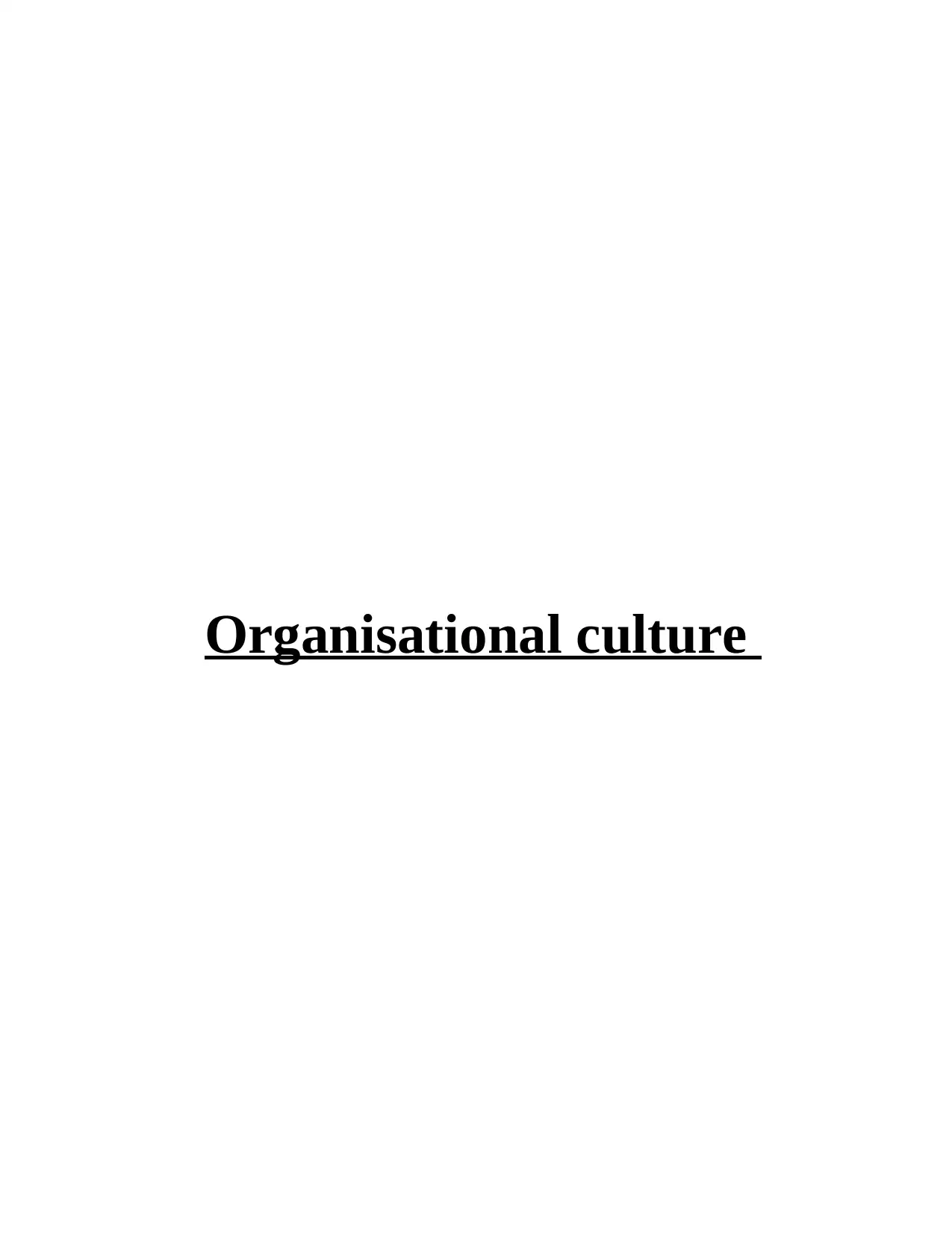
Organisational culture
Paraphrase This Document
Need a fresh take? Get an instant paraphrase of this document with our AI Paraphraser
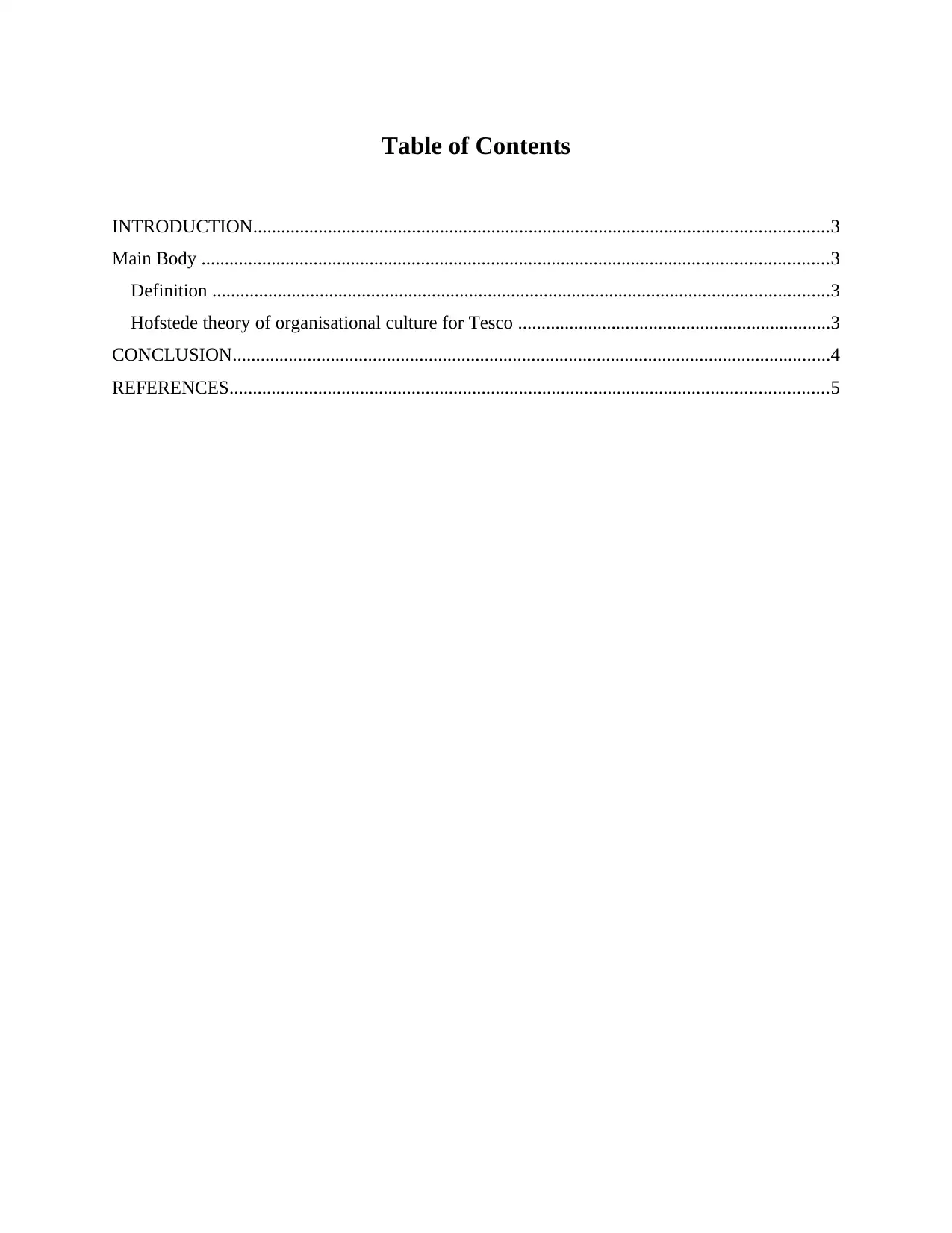
Table of Contents
INTRODUCTION...........................................................................................................................3
Main Body ......................................................................................................................................3
Definition ....................................................................................................................................3
Hofstede theory of organisational culture for Tesco ...................................................................3
CONCLUSION................................................................................................................................4
REFERENCES................................................................................................................................5
INTRODUCTION...........................................................................................................................3
Main Body ......................................................................................................................................3
Definition ....................................................................................................................................3
Hofstede theory of organisational culture for Tesco ...................................................................3
CONCLUSION................................................................................................................................4
REFERENCES................................................................................................................................5
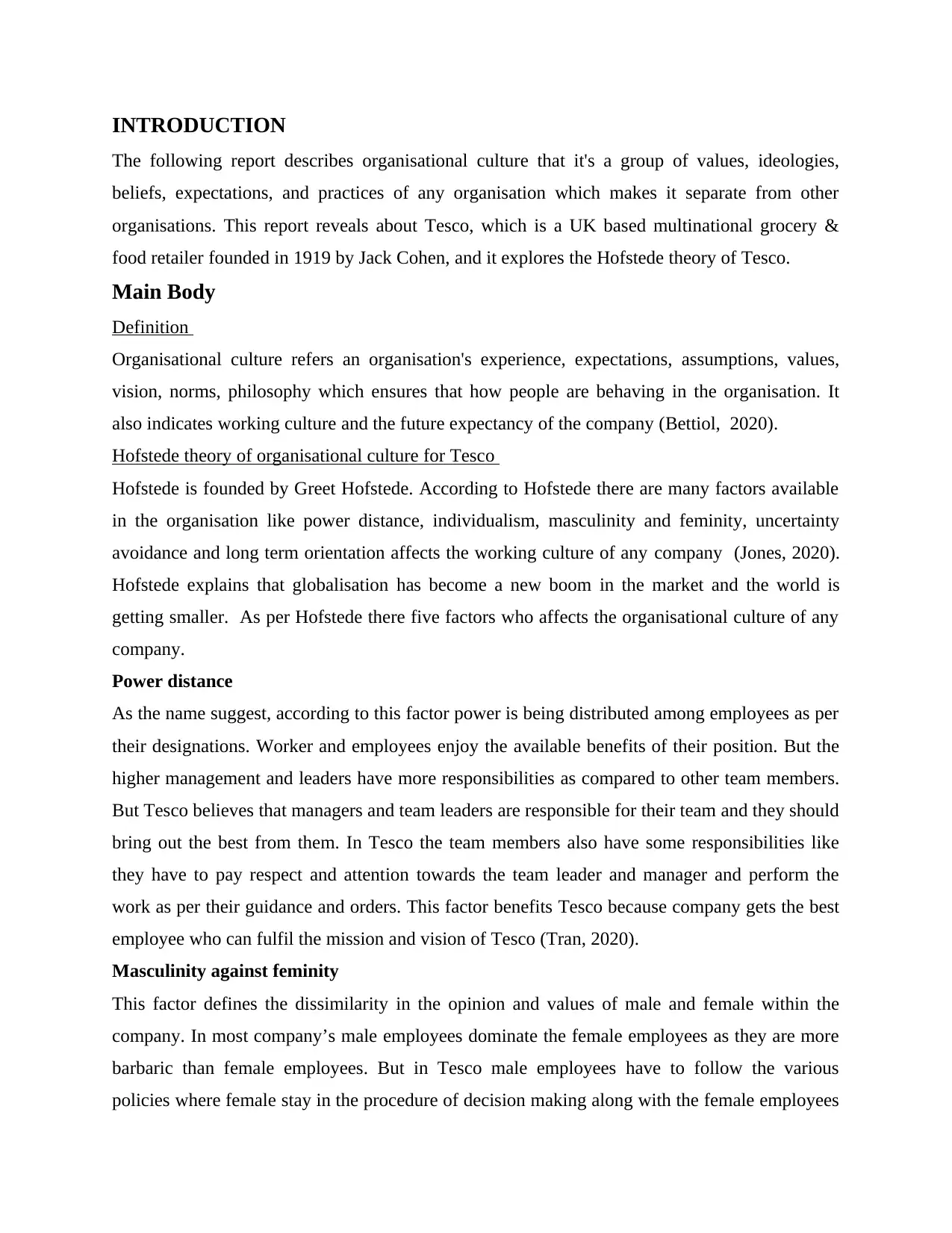
INTRODUCTION
The following report describes organisational culture that it's a group of values, ideologies,
beliefs, expectations, and practices of any organisation which makes it separate from other
organisations. This report reveals about Tesco, which is a UK based multinational grocery &
food retailer founded in 1919 by Jack Cohen, and it explores the Hofstede theory of Tesco.
Main Body
Definition
Organisational culture refers an organisation's experience, expectations, assumptions, values,
vision, norms, philosophy which ensures that how people are behaving in the organisation. It
also indicates working culture and the future expectancy of the company (Bettiol, 2020).
Hofstede theory of organisational culture for Tesco
Hofstede is founded by Greet Hofstede. According to Hofstede there are many factors available
in the organisation like power distance, individualism, masculinity and feminity, uncertainty
avoidance and long term orientation affects the working culture of any company (Jones, 2020).
Hofstede explains that globalisation has become a new boom in the market and the world is
getting smaller. As per Hofstede there five factors who affects the organisational culture of any
company.
Power distance
As the name suggest, according to this factor power is being distributed among employees as per
their designations. Worker and employees enjoy the available benefits of their position. But the
higher management and leaders have more responsibilities as compared to other team members.
But Tesco believes that managers and team leaders are responsible for their team and they should
bring out the best from them. In Tesco the team members also have some responsibilities like
they have to pay respect and attention towards the team leader and manager and perform the
work as per their guidance and orders. This factor benefits Tesco because company gets the best
employee who can fulfil the mission and vision of Tesco (Tran, 2020).
Masculinity against feminity
This factor defines the dissimilarity in the opinion and values of male and female within the
company. In most company’s male employees dominate the female employees as they are more
barbaric than female employees. But in Tesco male employees have to follow the various
policies where female stay in the procedure of decision making along with the female employees
The following report describes organisational culture that it's a group of values, ideologies,
beliefs, expectations, and practices of any organisation which makes it separate from other
organisations. This report reveals about Tesco, which is a UK based multinational grocery &
food retailer founded in 1919 by Jack Cohen, and it explores the Hofstede theory of Tesco.
Main Body
Definition
Organisational culture refers an organisation's experience, expectations, assumptions, values,
vision, norms, philosophy which ensures that how people are behaving in the organisation. It
also indicates working culture and the future expectancy of the company (Bettiol, 2020).
Hofstede theory of organisational culture for Tesco
Hofstede is founded by Greet Hofstede. According to Hofstede there are many factors available
in the organisation like power distance, individualism, masculinity and feminity, uncertainty
avoidance and long term orientation affects the working culture of any company (Jones, 2020).
Hofstede explains that globalisation has become a new boom in the market and the world is
getting smaller. As per Hofstede there five factors who affects the organisational culture of any
company.
Power distance
As the name suggest, according to this factor power is being distributed among employees as per
their designations. Worker and employees enjoy the available benefits of their position. But the
higher management and leaders have more responsibilities as compared to other team members.
But Tesco believes that managers and team leaders are responsible for their team and they should
bring out the best from them. In Tesco the team members also have some responsibilities like
they have to pay respect and attention towards the team leader and manager and perform the
work as per their guidance and orders. This factor benefits Tesco because company gets the best
employee who can fulfil the mission and vision of Tesco (Tran, 2020).
Masculinity against feminity
This factor defines the dissimilarity in the opinion and values of male and female within the
company. In most company’s male employees dominate the female employees as they are more
barbaric than female employees. But in Tesco male employees have to follow the various
policies where female stay in the procedure of decision making along with the female employees
⊘ This is a preview!⊘
Do you want full access?
Subscribe today to unlock all pages.

Trusted by 1+ million students worldwide
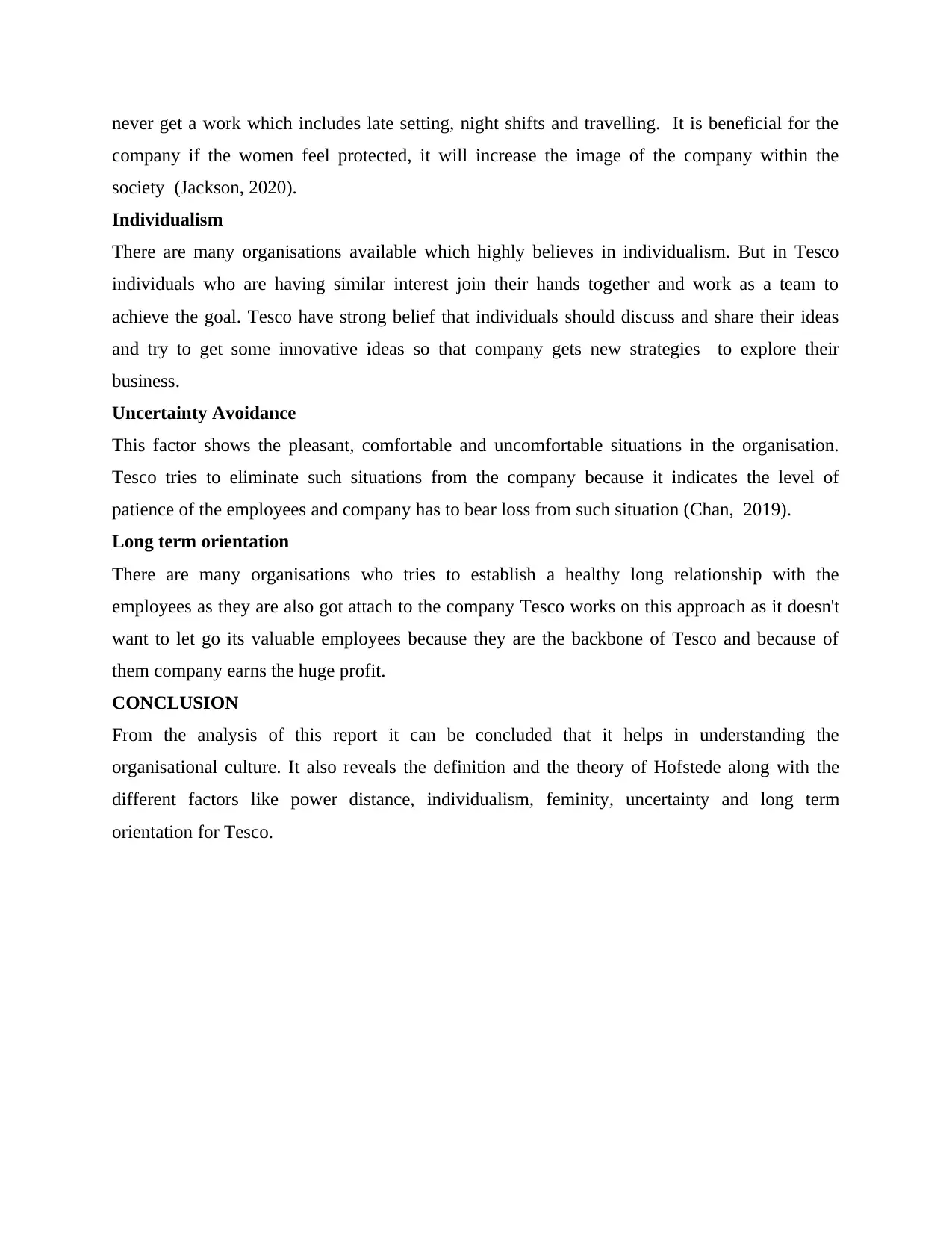
never get a work which includes late setting, night shifts and travelling. It is beneficial for the
company if the women feel protected, it will increase the image of the company within the
society (Jackson, 2020).
Individualism
There are many organisations available which highly believes in individualism. But in Tesco
individuals who are having similar interest join their hands together and work as a team to
achieve the goal. Tesco have strong belief that individuals should discuss and share their ideas
and try to get some innovative ideas so that company gets new strategies to explore their
business.
Uncertainty Avoidance
This factor shows the pleasant, comfortable and uncomfortable situations in the organisation.
Tesco tries to eliminate such situations from the company because it indicates the level of
patience of the employees and company has to bear loss from such situation (Chan, 2019).
Long term orientation
There are many organisations who tries to establish a healthy long relationship with the
employees as they are also got attach to the company Tesco works on this approach as it doesn't
want to let go its valuable employees because they are the backbone of Tesco and because of
them company earns the huge profit.
CONCLUSION
From the analysis of this report it can be concluded that it helps in understanding the
organisational culture. It also reveals the definition and the theory of Hofstede along with the
different factors like power distance, individualism, feminity, uncertainty and long term
orientation for Tesco.
company if the women feel protected, it will increase the image of the company within the
society (Jackson, 2020).
Individualism
There are many organisations available which highly believes in individualism. But in Tesco
individuals who are having similar interest join their hands together and work as a team to
achieve the goal. Tesco have strong belief that individuals should discuss and share their ideas
and try to get some innovative ideas so that company gets new strategies to explore their
business.
Uncertainty Avoidance
This factor shows the pleasant, comfortable and uncomfortable situations in the organisation.
Tesco tries to eliminate such situations from the company because it indicates the level of
patience of the employees and company has to bear loss from such situation (Chan, 2019).
Long term orientation
There are many organisations who tries to establish a healthy long relationship with the
employees as they are also got attach to the company Tesco works on this approach as it doesn't
want to let go its valuable employees because they are the backbone of Tesco and because of
them company earns the huge profit.
CONCLUSION
From the analysis of this report it can be concluded that it helps in understanding the
organisational culture. It also reveals the definition and the theory of Hofstede along with the
different factors like power distance, individualism, feminity, uncertainty and long term
orientation for Tesco.
Paraphrase This Document
Need a fresh take? Get an instant paraphrase of this document with our AI Paraphraser
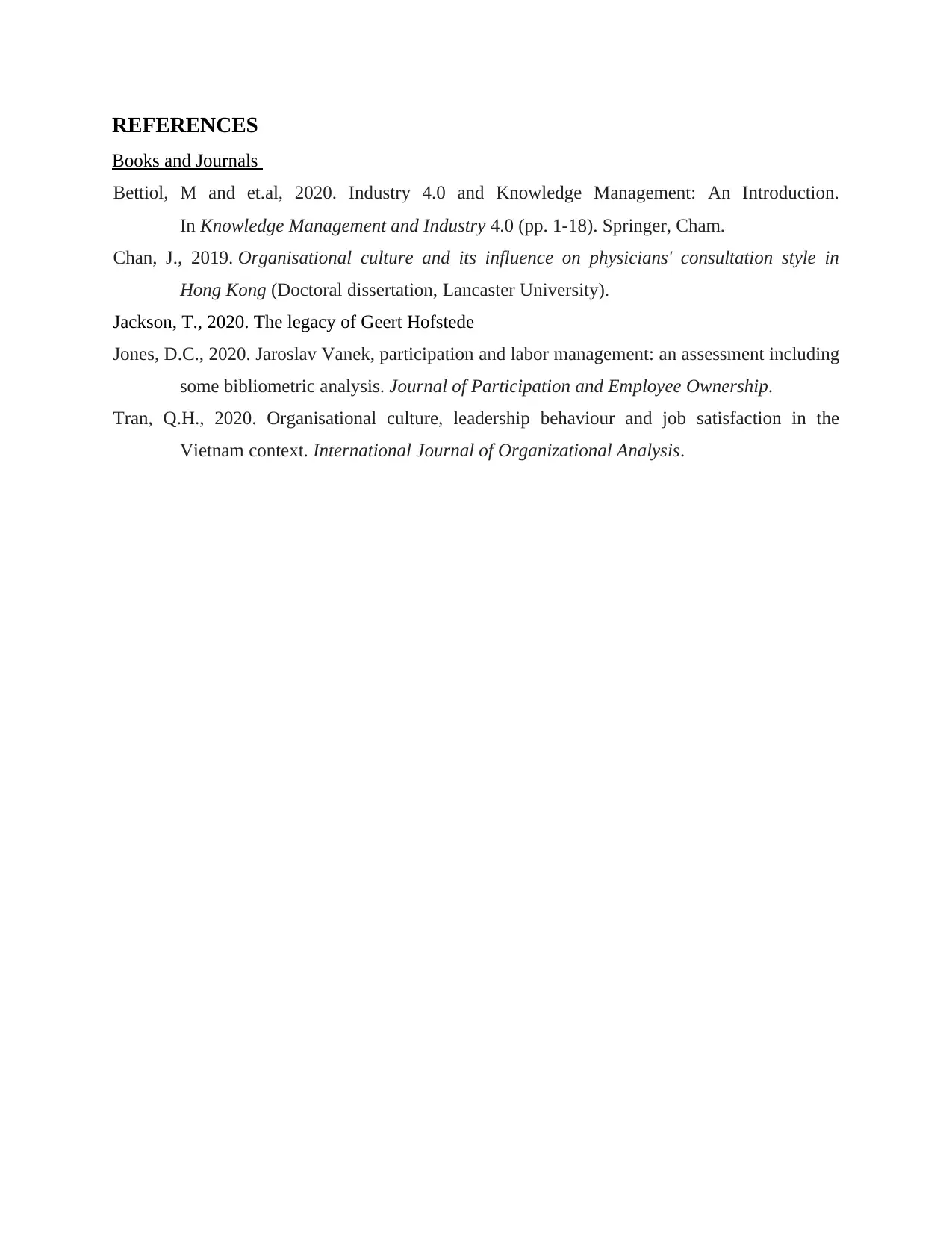
REFERENCES
Books and Journals
Bettiol, M and et.al, 2020. Industry 4.0 and Knowledge Management: An Introduction.
In Knowledge Management and Industry 4.0 (pp. 1-18). Springer, Cham.
Chan, J., 2019. Organisational culture and its influence on physicians' consultation style in
Hong Kong (Doctoral dissertation, Lancaster University).
Jackson, T., 2020. The legacy of Geert Hofstede
Jones, D.C., 2020. Jaroslav Vanek, participation and labor management: an assessment including
some bibliometric analysis. Journal of Participation and Employee Ownership.
Tran, Q.H., 2020. Organisational culture, leadership behaviour and job satisfaction in the
Vietnam context. International Journal of Organizational Analysis.
Books and Journals
Bettiol, M and et.al, 2020. Industry 4.0 and Knowledge Management: An Introduction.
In Knowledge Management and Industry 4.0 (pp. 1-18). Springer, Cham.
Chan, J., 2019. Organisational culture and its influence on physicians' consultation style in
Hong Kong (Doctoral dissertation, Lancaster University).
Jackson, T., 2020. The legacy of Geert Hofstede
Jones, D.C., 2020. Jaroslav Vanek, participation and labor management: an assessment including
some bibliometric analysis. Journal of Participation and Employee Ownership.
Tran, Q.H., 2020. Organisational culture, leadership behaviour and job satisfaction in the
Vietnam context. International Journal of Organizational Analysis.

⊘ This is a preview!⊘
Do you want full access?
Subscribe today to unlock all pages.

Trusted by 1+ million students worldwide
1 out of 6
Related Documents
Your All-in-One AI-Powered Toolkit for Academic Success.
+13062052269
info@desklib.com
Available 24*7 on WhatsApp / Email
![[object Object]](/_next/static/media/star-bottom.7253800d.svg)
Unlock your academic potential
Copyright © 2020–2026 A2Z Services. All Rights Reserved. Developed and managed by ZUCOL.





